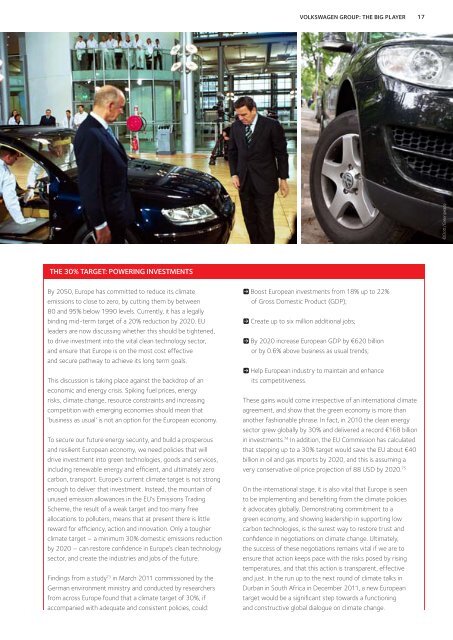The Dark Side of Volkswagen - Greenpeace
The Dark Side of Volkswagen - Greenpeace
The Dark Side of Volkswagen - Greenpeace
Create successful ePaper yourself
Turn your PDF publications into a flip-book with our unique Google optimized e-Paper software.
THE 30% TARGET: POWERING INVESTMENTS<br />
By 2050, Europe has committed to reduce its climate<br />
emissions to close to zero, by cutting them by between<br />
80 and 95% below 1990 levels. Currently, it has a legally<br />
binding mid-term target <strong>of</strong> a 20% reduction by 2020. EU<br />
leaders are now discussing whether this should be tightened,<br />
to drive investment into the vital clean technology sector,<br />
and ensure that Europe is on the most cost effective<br />
and secure pathway to achieve its long term goals.<br />
This discussion is taking place against the backdrop <strong>of</strong> an<br />
economic and energy crisis. Spiking fuel prices, energy<br />
risks, climate change, resource constraints and increasing<br />
competition with emerging economies should mean that<br />
‘business as usual’ is not an option for the European economy.<br />
To secure our future energy security, and build a prosperous<br />
and resilient European economy, we need policies that will<br />
drive investment into green technologies, goods and services,<br />
including renewable energy and efficient, and ultimately zero<br />
carbon, transport. Europe’s current climate target is not strong<br />
enough to deliver that investment. Instead, the mountain <strong>of</strong><br />
unused emission allowances in the EU’s Emissions Trading<br />
Scheme, the result <strong>of</strong> a weak target and too many free<br />
allocations to polluters, means that at present there is little<br />
reward for efficiency, action and innovation. Only a tougher<br />
climate target – a minimum 30% domestic emissions reduction<br />
by 2020 – can restore confidence in Europe’s clean technology<br />
sector, and create the industries and jobs <strong>of</strong> the future.<br />
Findings from a study 73 in March 2011 commissioned by the<br />
German environment ministry and conducted by researchers<br />
from across Europe found that a climate target <strong>of</strong> 30%, if<br />
accompanied with adequate and consistent policies, could:<br />
©Picture Alliance<br />
VOLKSWAGEN GROUP: THE BIG PLAYER<br />
P Boost European investments from 18% up to 22%<br />
<strong>of</strong> Gross Domestic Product (GDP);<br />
P Create up to six million additional jobs;<br />
P By 2020 increase European GDP by ¤620 billion<br />
or by 0.6% above business as usual trends;<br />
P Help European industry to maintain and enhance<br />
its competitiveness.<br />
<strong>The</strong>se gains would come irrespective <strong>of</strong> an international climate<br />
agreement, and show that the green economy is more than<br />
another fashionable phrase. In fact, in 2010 the clean energy<br />
sector grew globally by 30% and delivered a record ¤168 billion<br />
in investments. 74 In addition, the EU Commission has calculated<br />
that stepping up to a 30% target would save the EU about ¤40<br />
billion in oil and gas imports by 2020, and this is assuming a<br />
very conservative oil price projection <strong>of</strong> 88 USD by 2020. 75<br />
On the international stage, it is also vital that Europe is seen<br />
to be implementing and benefiting from the climate policies<br />
it advocates globally. Demonstrating commitment to a<br />
green economy, and showing leadership in supporting low<br />
carbon technologies, is the surest way to restore trust and<br />
confidence in negotiations on climate change. Ultimately,<br />
the success <strong>of</strong> these negotiations remains vital if we are to<br />
ensure that action keeps pace with the risks posed by rising<br />
temperatures, and that this action is transparent, effective<br />
and just. In the run up to the next round <strong>of</strong> climate talks in<br />
Durban in South Africa in December 2011, a new European<br />
target would be a significant step towards a functioning<br />
and constructive global dialogue on climate change.<br />
17<br />
©Dott/<strong>Greenpeace</strong>

















